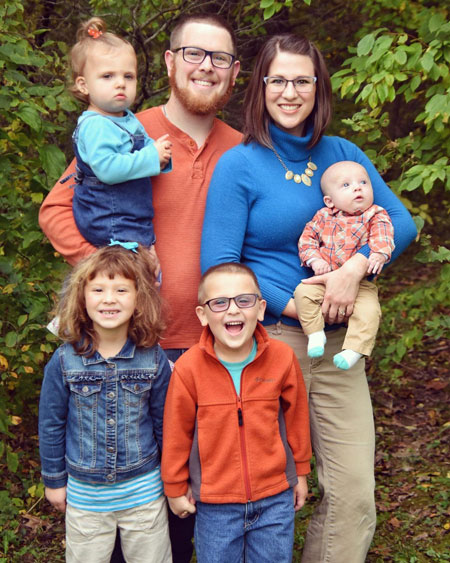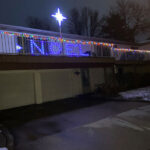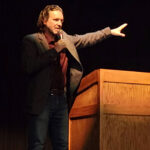By Lindsay Steele
The Catholic Messenger
(Editor’s note: National Natural Family Planning Awareness Week is July 19-25. It celebrates God’s gift of marriage and vision for human sexuality and highlights the anniversary of the papal encyclical Humanae Vitae, released July 25, 1968.)

Brandon and Emily Nitcher pose for a photograph with their children Willa, Zeke, Xyla and Uriah taken last fall. The Nitchers teach a diocesan-approved Natural Family Planning introduction course to engaged couples, which is now offered online due to the COVID-19 pandemic.
In the early years of their marriage, Brandon and Emily Nitcher struggled to conceive a child. “It was a very difficult time in our marriage,” Emily Nitcher said.
Though their family eventually grew, the couple again struggled to conceive after the birth of their second child. By learning and practicing the sympto-thermal method of Natural Family Planning, which uses body temperature and other signs to determine a woman’s fertility window, Emily discovered that she had abnormal progesterone levels. “After we were able to remedy it, we were able to conceive and carry our third and our fourth child to term. Without NFP, we truly do not believe either of them would exist.”
For the past few years, the Nitchers, both 33, have shared their story during the Natural Family Planning (NFP) intro courses they offer for engaged couples. Couples who wish to marry in the Diocese of Davenport must take a diocesan-approved NFP course as part of their marriage prep. NFP is the only method of family planning approved by the church.
“Although Natural Family Planning is in line with the church’s teachings and God’s vision for sex and marriage, it is 100 percent scientifically based and researched, and just makes good sense when you take the time to understand it,” Emily Nitcher said. “This isn’t your grandmother’s Rhythm Method!”
Older, calendar-based methods of NFP gained a negative reputation for being unreliable, as they did not take into account the variances in a woman’s cycle. However, newer, symptom-based NFP methods demonstrate an accuracy of about 99 percent in identifying times of fertility and infertility, according to the European Society for Human Reproduction and Embryology. Symptom-based NFP methods help couples identify times of peak fertility. Couples can use this information to attempt to achieve or avoid pregnancy.
During the COVID-19 pandemic, the Nitchers have gone from teaching the course at their parish, St. Mary-Solon, to a virtual one. This change of format has produced some unexpected benefits. The Nitchers are able to offer classes more frequently, once a month rather than four times a year. Fewer couples are involved in each session, which generally makes the couples feel more at ease asking difficult and personal questions, Emily Nitcher said. Logging in from home is also more convenient and comfortable for couples.
It has been easier for the Nitchers to build relationships with the couples because online instruction requires more correspondence prior to instruction — sending materials and links via email, for example. “This has led to a lot more follow-up from couples emailing us questions or looking for additional resources after they’ve had time to process what we’ve shared, which has been great. I think they see us as a more approachable resource to them and their marriage.”
Video conferencing has become the standard for NFP instruction during the pandemic, said Marianne Agnoli, diocesan marriage and family life coordinator. She is pleased that teachers and couples are finding benefits in this approach. She hopes more couples will choose live, virtual courses because video-based courses do not offer personal instruction. While both approaches fulfill the diocesan requirement, personal instruction is preferable “because it is more interactive and you can ask questions,” Agnoli said. A full list of diocesan-approved intro to NFP options is available at https:// www.davenportdiocese.org/natural-family-planning.
Ideally, couples who take the intro courses will express an interest in working with an instructor to learn a specific method, Agnoli said. Maria Helfenberger and her fiancé, Matt Leddin, plan to marry on New Year’s Eve at St. Paul the Apostle Catholic Church-Davenport. After taking the intro to NFP course from the Nitchers, “we wanted to know more about it,” Helfenberger said. She and her fiancé are learning the Billings method from Agnoli through video conferencing.
Although the couple experienced internet issues during their first session with Agnoli, something the Nitchers also mentioned as a potential issue, Helfenberger said she and her fiancé enjoy the convenience of video conferencing. “It’s easier to coordinate, the schedule is more flexible, and we don’t have to travel anywhere.” So far, they have had a two-hour initial instruction and a 45-minute follow-up with Agnoli. Helfenberger takes photographs of her charts and sends them to Agnoli. The two correspond regularly.
The Nitchers hope that other couples who take their NFP intro courses will “see that we went through the same struggles many of them are facing, and that they develop a better understanding of the church’s teaching on NFP,” Emily Nitcher said. “Mostly, we hope that they see that there is always time to change. It took us over two years after first learning about NFP before we actually decided to start using it. It’s never too late to start, and it’s always worth it!”
Support The Catholic Messenger’s mission to inform, educate and inspire the faithful of the Diocese of Davenport – and beyond! Subscribe to the print and/or e-edition, or make a one-time donation, today!











